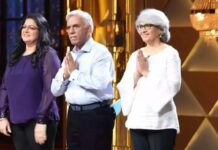Nusrat Fateh Ali Khan Biography: Nusrat Fateh Ali Khan was a Pakistani musician and vocalist whose voice is regarded as one of the finest ever recorded. He was predominantly a performer of Sufi devotional music, qawwali. As a singer, he possessed an extraordinary vocal and was capable of maintaining a high level of intensity for several hours. Born into a household of accomplished singers and musicians, he became interested in the art form at an early age. However, his father wanted him to become a doctor or an engineer because he believed that qawwali musicians had a low social standing. However, fate had other ideas, and Nusrat also became a musician and vocalist.
Nusrat Fateh Ali Khan Biography
| Bio | |
|---|---|
| Real Name | Nusrat Fateh Ali Khan Pervaiz Ali Khan (Born) |
| Profession | Singer & Music composer |
| Physical Stats & More | |
| Height (approx.) | in centimeters– 170 cm in meters– 1.70 m in feet inches– 5’ 7” |
| Weight (approx.) | in kilograms– 136 kg in pounds– 299 lbs |
| Eye Colour | Black |
Youth and Early Life
Nusrat Fateh Ali Khan was born in Hazara, Faisalabad, Punjab, Pakistan on October 13, 1948. After the partition of India in 1947, his Punjabi Muslim family moved to Pakistan from their native city of Jalandhar in East Punjab, British India.
Fateh Ali Khan, his father, was a musicologist, singer, instrumentalist, and qawwal. There were four older sisters and one younger sibling in Nusrat’s family. He was descended from a family with a long tradition of qawwali music. Two of his relatives were also renowned qawwals: Ustad Mubarik Ali Khan and Ustad Salamat Ali Khan.
As he believed that qawwals had a low social status, his father wanted Nusrat to become a physician or an engineer. Nevertheless, Nusrat received vocal and tabla instruction.
In 1964, when Nusrat was 16 years old, his father perished. Nusrat had a premonition in which his father instructed him to sing ten days after his passing. Forty days later, the child gave his first public performance at his father’s funeral.
Nusrat Fateh Ali Khan Profession
Nusrat Fateh Ali Khan joined his brothers in performing and developed into a gifted qawwali singer. As he matured as a performer, he added his own creative flourishes to his music and developed his distinctive, one-of-a-kind qawwali singing style.
His uncle Mubarak Ali Khan passed away in 1971, and Nusrat Khan became the official leader of the family Qawwali party, which became known as “Nusrat Fateh Ali Khan, Mujahid Mubarak Ali Khan & Party”
As the leader of the family party, he gave his first performance at a Radio Pakistan-sponsored annual music festival known as ‘Jashn-e-Baharan’ studio recording broadcast. There, he sang in a number of different languages, including Urdu, Punjabi, Persian, and Hindi.
Soon he achieved widespread renown and firmly established himself. Pakistan as one of the most well-known qawwals of his time period. He was gifted with a strong voice and great endurance, enabling him to maintain a high level of intensity for several hours. In concerts, he was accompanied by tabla, harmoniums, and backup vocals.
Khan performed at the World of Music, Arts, and Dance (WOMAD) festival in London in 1985, shortly after his popularity had spread beyond Pakistan. Then he began touring and performing extensively, travelling to Paris in 1985 and 1988 and Japan in 1987 at the Japan Foundation’s invitation. In 1989, he performed at New York’s Brooklyn Academy of Music.
In 1992–1993, he served as a Visiting Artist in the Ethnomusicology department at the University of Washington, Seattle, as his popularity skyrocketed in the 1990s.
Throughout his career, he has also released several albums and contributed to the soundtracks of numerous international films. On the albums ‘Mustt Mustt’ (1990) and ‘Night Song’ (1995), he collaborated with Canadian musician Michael Brook. In 1988, he collaborated with Peter Gabriel on the ‘The Last Temptation of Christ’ soundtrack, which afforded him the opportunity to combine qawwalis with Western music.
Nusrat Fateh Ali Khan performed and sang in a number of Pakistani and Indian films. Songs such as “Koi Jane Koi Na Jane,” “Saya Bhi Saath Jab Chhod Jaye,” and “Dulhe Ka Sehra” were performed by him for Indian films. He also contributed the song ‘Gurus of Peace’ to the Indian album ‘Vande Mataram’, which was published to commemorate India’s 50th anniversary of independence.
Nusrat Fateh Ali Khan Major Works
Nusrat Fateh Ali Khan was one of the first musicians to introduce Western audiences to qawwali. His remarkable vocal range and powerful, intoxicating voice mesmerised audiences not only in his native Pakistan, but around the globe. The albums ‘Mustt Mustt,’ ‘The Day, The Night, The Dawn, The Dusk,’ ‘Night Song,’ and ‘Sangam’ are among his most popular.
Honours & Accomplishments
1987 saw the presentation of the President of Pakistan’s Award for Pride of Performance to Nusrat Fateh Ali Khan for his contribution to Pakistani music.
The UNESCO Music Prize was awarded to him in 1995, and the Grand Prix des Amériques at the Montreal World Film Festival the following year.
CNN included him on its list of the twenty most iconic musicians of the past fifty years in August 2010.
Nusrat Fateh Ali Khan Personal Life and Legacy
1979 saw the marriage of Nusrat Fateh Ali Khan to his first cousin Naheed, the daughter of his uncle Salamat Ali Khan. Nida was their daughter.
He became ailing with kidney and liver failure in London in 1997. On August 16, 1997, he suffered a fatal heart attack and passed away. He had 48 years of age. His nephew, Rahat Fateh Ali Khan, is now carrying on Khan’s musical legacy.
Death
After travelling to London from his native Pakistan for treatment for liver and kidney problems, he was rushed from the airport to the Cromwell Hospital in London, where he died of a sudden cardiac arrest on 16 August 1997, aged 48. His body was repatriated to Faisalabad, and his funeral was a public affair.




